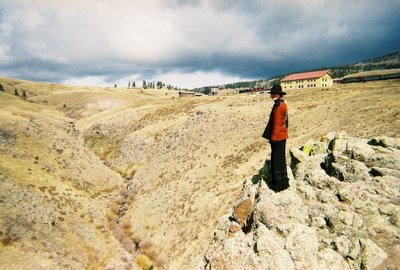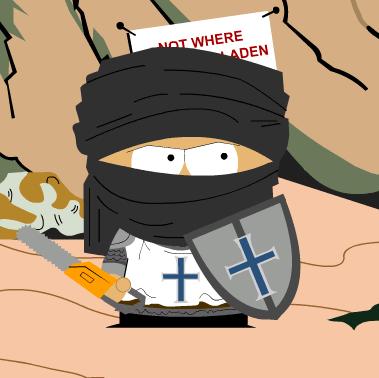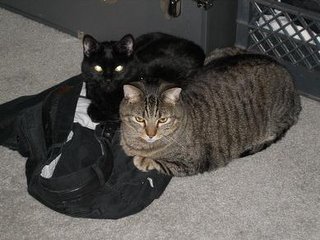The music [No. 3] held me spellbound from the first few notes -- and what notes they were! Great hammer blows from the whole orchestra, abrupt and startling -- jabs of fortissimo that each came as a shock: there was no rhythmic pattern to them, so that you could not tell when the next was coming. Each fell like a thunderclap -- and then suddenly you see that the music is actually going somewhere -- you feel it literally springing to life, taking form right before your eyes (or ears.) And all at once you are swept away: the music soars and expands.
Friday, February 24, 2006
Thursday, February 23, 2006
A cave so huge helicopters can fly into it has just been discovered deep in the hills of a South American jungle paradise.Full article.
...
As a bonus, researchers also discovered a new dendrobatid frog species, Colostethus breweri, named for the frog’s identifier, Charles Brewer-Carías. Dendrobatid frogs make up the group of amphibians commonly known as "poison dart" frogs.
UPDATE: Stupid Greek. "Fixed".
 The Peacock Angel
The Peacock Angel
Don't miss some wonderful reporting on the ground with Yezidis. Michael Totten visited their holiest site, where the universe began. Michael Yon also sought out Yezidis, and paints an interesting portrait of their current situation.
Wednesday, February 22, 2006
Ski Cooper near Leadville is the perfect family ski hill. The terrain is nowhere particularly challenging, but it was cheap, far from crowded even on a relatively busy weekend, slopes wide open, no dodging bodies anywhere. It would be a splendid place to learn to ski, or to ski with children. The views of the Sawatch and Gore ranges were wonderful as well.
On the way home we turned aside to visit the Great Sand Dunes. On our way to the top of High Dune, we found small fulgurites, hollow tubes of sand fused by a lightning strike, gritty on the outside, glassy on the inside, curving and branching, fossilized electricity. We skied down the angle-of-repose sand faces, barefoot in cold sand and cold wind. We drove home quite sandy.
15,000 atheists in London rioted after a blank sheet of paper was found on a cartoonist's desk.
Sunday, February 19, 2006
but a man with no manners,
a man with no manners--
why doesn't he just die!
See the rat--at least it's got teeth,
but a man with no decorum,
a man with no decorum--
what's keeping him! why doesn't he die!
See the rat--at least it's got legs,
but a man without courtesy,
a man without courtesy,
why doesn't he hurry up and die!
--From the Book of Songs, trans. Burton Watson
Thursday, February 16, 2006
In his defense of AI’s achievements, quoted above, Raj Reddy said that, “The trouble with those people who think that computer intelligence is in the future is that they have never done serious research on human intelligence.... Let’s stop using the future tense when talking about computer intelligence.” Those who say that machine intelligence exists in the future do have the tense wrong, but not in the way Reddy suggests: Machine intelligence is really in the past; when a machine does something “intelligent,” it is because some extraordinarily brilliant person or persons, sometime in the past, found a way to preserve some fragment of intelligent action in the form of an artifact. Computers are general-purpose algorithm executors, and their apparent intelligent activity is simply an illusion suffered by those who do not fully appreciate the way in which algorithms capture and preserve not intelligence itself but the fruits of intelligence.
Wednesday, February 15, 2006

By the by, have I mentioned just how excellent Mrs. Peculiar is? Item: the dinner I found waiting for me Monday night was nothing other than Toad in the Hole! Item the second: for Valentine's Day, not only was she willing to listen to Tristan und Isolde with me, she suggested it!
I could say much more, but it would be wrong to excite too overwhelming a jealousy in our readers.

A fine new reference, worthy of sidebar status: Bird Families of the World! The above, if you're wondering, is a lyrebird.
And if you have time on your hands, Blugreen Pictures has fine photography of anything and everything related to the ocean.
Video here.
Now that's a cephalopod attack!
(Hat tip: Dappled Things.)
Tuesday, February 14, 2006

Speaking of avatars, try the Mini-Mizer.
That thing on my back is a jetpack. I crocheted the scarf myself!
Sunday, February 12, 2006
"What a lovely night."
"Yes, we're lucky it's so nice tonight."
"Mm."
A pause, a sip of wine. "Do you think we can go back inside?"
"The smoke still looks pretty thick. I think we'd better wait a little longer."
I had been making sopapillas--and successfully, too, until the plastic slotted spoon I had been using melted, sending up enormous clouds of greasy smoke from the frying oil. After the smoke alarm went off, concerned neighbors called the fire department, who broke down the door, sprayed fire-retardant foam everywhere, and dragged us outside.
Or at least that's what would have happened, if I hadn't had the presence of mind to smash the smoke alarm with a really excellent flying front kick before it had a chance to wreak our lives. Thus, we were on the balcony, enjoying the doughy fruits of my labour and waiting for the air to clear so we could watch the Simpsons.
Sopapillas
3 cups flour
1/3 cup vegetable oil (+ approximately 2 cups for frying)
2 tbs sugar
1 tps baking powder
2 tbs salt
1 cup warm water
Mix flour, sugar, and baking powder in a large bowl. Sprinkle in 1/3 cup of oil, mixing as you go, until the mixture is grainy.
Dissolve the salt in the water and add to the flour. Mix with your hands until the texture is consistently doughy. Knead the dough for three minutes, then place on a floured surface and roll out until about 1/4 of an inch thick. Cut into 3 inch squares.
Heat the 2 cups of oil in a saucepan on high heat. When ready, drop the squares of dough in. Burn the first three or five. Melt a plastic spoon over the next couple. Fill the house with smoke. The rest should be a perfect golden brown, although it may be hard to tell with your eye watering. Sprinkle powdered sugar over the survivors. Bite off one corner, curse, and pick a cooler one. Bite off that one's corner and fill with honey. Eat outside, for the sake of the carpet and your lungs.
Lick your fingers. Shiver.
Thursday, February 09, 2006
Filled with crabby italics and acerbic asides, the 520 or so yellowing and stained pages are the handwritten minutes of the Royal Society as recorded by the brilliant scientist Robert Hooke, one of the society's original fellows and curator of experiments.May we please have the complete text online? (Thank you Rachel.)The notes describe in detail some of the most astounding and outlandish scientific thinking from meetings of the society between 1661 to 1682. There is the very earliest work with microscopes, confirming the first sightings of sperm and micro-organisms. There is correspondence with Sir Isaac Newton and Sir Christopher Wren over the nature of gravity, with the latter's proposal to fire bullets into the air to see where they might drop. And there is a page that lays to rest the bitter controversy over who designed the watch that would eventually lead to the first measurements of longitude...
Minutes from December 1679 describe correspondence between Hooke and Newton proposing an experiment to confirm the rotation of the Earth. The notes include a suggestion from Sir Christopher Wren, Hooke's closest friend, to test the hypothesis by "shooting of a bullet upwards at a certaine angle from the perpendicular round every way - thereby to see whether the bullets soe shot would all fall in a perfect circle".
Why, oh why, does the public not support contemporary arts?
"Suicide is preventable and treatable."Do they mean necromancy?
Saturday, February 04, 2006
(This news is almost a month old, but I missed it until recently. I suspect others might have as well.)
Heinrich Harrer, a great mountaineer, Twentieth-Century explorer, writer and geographer died on January 7th, aged 93. I have been familiar with his Tibetan travels from my youth, and Seven years in Tibet remains one of the best reads in mountaineering/Himalayan exploration literature. Harrer's account and photographs are some of the finest documents we have of Tibet as it was. He is also well know for the first ascent of the North Face of the Eiger. I was unaware until recently, however, that he also made the first ascent of Carstensz Pyramid, a 16,000' peak in New Guinea which is now generally counted as the seventh summit (representing Australasia/Oceania, since Australia's high point is, frankly, rather disappointing).
Unfortunately, much of the press attention to Harrer late in his life and after his death dwells on his fleeting and superficial connection to the Nazi party. I have no doubt that anyone who actually takes the trouble to read his books and examine his life will see his personal goodness as self-evident. His life and deeds as a whole speak much louder than a few bureaucratic documents. John Derbyshire asserts (in a podcast, not archived) that most of the Nazi muckracking which attended the film Seven Years in Tibet originated from the Communist Chinese, which makes perfect sense. The Chinese doubtless have a major interest in discrediting so excellent a documentor and defender of the kingdom they brutally invaded.
The Twentieth Century was the last, and in some ways the best, of the five centuries of great explorations. There are still innumerable oddities awaiting discovery in space and in the deep sea; there remain unclimbed peaks and walls, unentered cirques and valleys, ground where no man has stood; the intrepid can still find ample scope for personal adventure and discovery. But the world is different. Sea and space are not places we can experience without mediation. We can't get our hands dirty there, and their exploration is largely the domain of robots, not humans. Even the remotests peoples will now know who we are, as we have heard tell of all of them. And the remaining wildernesses are places we venture, but do not remain; our interaction with them is always artificial and temporary. As we lose Harrer and the last few like him, we are losing the knowledge of how it feels to enter a forbidden kingdom, discover a lost tribe, find a means of life in an empty land, venture beyond the edge of all our maps. I fear already young people are unmoved by tales of discovery because they cannot imagine how it would feel to truly discover a thing by themselves. There are many for whom a photo essay or a documentary film is a perfectly acceptable substitute for a physical journey. The wonder of beholding living creation is being replaced by the wonder of fantasy. Fantasy wonders are not bad things in themselves, but are they enough to make people step outside themselves and feel the world, their fellow men and the divine? Explorers' writings need to be read, and hard paths need to be traveled. Otherwise, life is only a game with nothing at stake.
A BIZARRE infectious cancer seems to be the cause of the fatal facial tumours that are wiping out Tasmanian devils, the world's largest surviving carnivorous marsupial. The disease, which has killed at least a third of the wild population since the mid-1990s, had now infected devils across more than half the island.The idea of this cancer leading an existence as a parasitic but nevertheless somehow separate entity reminds me of HeLa cells.
Early analysis of the tumours suggested that the animals may be passing on cancerous cells during fights (New Scientist, 6 July 2005). Now a team led by Anne-Maree Pearse of Tasmania's department of primary industries has performed a genetic analysis of tumour cells from 37 animals.
Results from the first 11 animals reveal that all the tumours contain cells with 13 grossly abnormal chromosomes, instead of the usual 14 healthy ones (Nature, DOI:10.1038/439549a). They were genetically identical whatever their stage of development, suggesting they did not arise in the animals' own tissue. "The cancerous cell line is leading a sort of independent existence," Pearse says.
HeLa cells have proven difficult to control. They sometimes contaminate other cell cultures growing in the same laboratory, interfering with biological research. The degree of contamination is unknown, because few researchers test the identity or purity of already-established cell lines. It has been claimed that a substantial fraction of in vitro cell lines are actually HeLa, their original cells having been overwhelmed by a rapidly growing population derived from HeLa contaminant cells. Walter Nelson-Rees was the first to publish on the contamination of cell lines by HeLa. It has been estimated that the total mass of HeLa cells today far exceeds that of the rest of Henrietta Lacks' body.Life is stranger than we think.
Sometime in the fourth century B.C., a Greek merchant ship sank off Chios and the Oinoussai islands in the eastern Aegean Sea. The wooden vessel may have succumbed to a storm or a fire, or maybe rough weather caused the cargo of 400 ceramic jars filled with wine and olive oil to shift without warning. The ship went down in 60 meters (about 200 feet) of water, where it remained unnoticed for centuries.Sadly, the robot did not answer the most important question: was the wine still any good?
The classical-era ship might never have divulged to archaeologists its clues to ancient Greek culture, except for a research team from MIT, the Woods Hole Oceanographic Institute (WHOI), the Greek Ministry of Culture and the Hellenic Centre for Marine Research (HCMR). They used a novel autonomous underwater vehicle (AUV) to make a high-precision photometric survey of the site last July. Using techniques perfected by MIT and WHOI researchers over the past eight years, the robot accomplished in two days what would have taken divers years of effort.
Ecosystems services to humans can somtimes be simply assessed, as in the case of fish harvested from the sea, but in other instances may be indirectly enjoyed in ways that can be complex and difficult to determine. Management based on ecosystem services requires a full understanding of the complex ways in which these services benefit humans. The valuation of ecosystem services is also necessary for the accurate assessment of the trade-offs involved in different management options. Valuation can be expressed in economic terms in many instances, using an expanding set of practical valuation techniques. These valuations should reflect the significance or importance of the ecological service categories, and ideally the valuations of unit changes in the levels of those services across management options. When unit valuations based on ratio or interval scales are not feasible, practical methods of scoring, ranking, or rating can be used in combination with assessments of the changes in service flows.By refusing to apply standards of economic value to the services nature provides, we end up not avoiding all comparisons based on economic considerations, but rather assuming that the natural system has value only as raw resources. Making explicit those values helps us make rational decisions.
"The situation in New Orleans is classic," said Farber, who was on the National Academy of Sciences panel that reviewed Louisiana's coastal restoration plan, both before and after the disaster. "Before Katrina, everyone was saying that there were not enough wetlands to protect the city. A crude 'rule of thumb' is that three miles of wetlands will reduce storm surges by one foot, and that an acre of wetlands provides roughly $20,000 worth of services. But that same acre would sell for only $500. The gap between market value and social value is huge…if everything in the grocery store was free, we'd walk out with it all. Markets, then, cannot be relied upon to preserve resources of great social value, such as wetlands."I'm not entirely sure that Farber's conclusion that "markets...cannot be relied upon to preserve resources of great social value" is complete. It is true, I think, but it is also true that government projects can destroy the very areas they were created to protect. It's an issue where neither the privitisation nor the centralized control of an asset is always correct, but rather one in which the only right action is the action that is right for this particular instance. No general rules, no easy answers.
Via Eurekalert.
And if you need something that involves plastic bricks and giant robots....
We're going to pick up Mrs. Peculiar's car today, which hasn't started in two weeks. What was wrong with it, concerned readers may ask? The damn thing was convinced that it's 30 degrees below zero, and helpfully compensated by instantly flooding the engine. Fortunately for us, it proved to be a problem with the thermometer, a relatively minor ailment. Had it been a computer issue, we would have been in deep.
On top of that, we just got our Logick Engine back from a computer whisperer. (Let me add he did a great job, aged about 50 and lives with his mom, but he's cool, fixed us up for $30, whereas the goons at Best Buy wanted $150 just to get started.) It took a sudden notion that our CD/CD-ROM/DVD hardware had ceased to exist.
Why on earth does everyone regard computers as a stable, reliable technology? They're more hypochondriac than Mr. Woodhouse, and their maladies seem generally of an occult nature, caused by imbalances in their Logickal Humours and the malevolences of bodiless assailants.
As the readers has probably gathered by now, my relationship with computers operates very much in the spirit of a cargo cult: I wish to offer a moderately credible icon of propitiation and thereby receive wondrous bounty; I am inclined to attribute any irregularities to Daemonic influence. I understand intellectually that this is not a tenable position. But my point stands that the Number-Sorcerors are not as trustworthy as their acolytes would have us belive. Things go wrong with them all the time, and there exists an enormous industry dedicating to palliating the hassles they create. And yet we are asked increasingly to predicate all other aspects of our life on them, our transportation, our utilities, our kitchens, our health, our art. The problem is very clear with automobiles. I know a person who drove his new car over a stick, threw a sensor out of whack; no one in his or adjoining counties could even begin to look at it, and after a tow to the city it cost $500 just to begin repairs. This for a car with a 100% functional engine: it's absurd. Why is this touted as progress? For my next car, I think I may shop for a 50s vintage Ford truck, devote myself to home repair, and get to have the bitchen wrap-around windshield.
(Similarly, capacity, convenience and reliability of data storage media are one of the reasons I have decided to eschew digital a while longer in my search for some decent photography gear. I may post more on this in future.)
Sigh. I can't bring myself to be a total Luddite, though, appealing as it is. Sometimes technology does help people. For instance, Virgin Mobile will now make fake emergency calls to subscribers, to aid and abet their weaseling out of awkward social situations. Oh brave new world, that has such people in it!
Better yet, they're making cell phones that incorporate breathalyzers (scroll down to "Sports car-design phone"). Will these assist bitter, jilted drunks in their efforts not to violate yet another restraining order by calling their ex-s in the wee hours? But I'd want one with a Herodotus Persian debate option (scroll to 1:133): a setting that wouldn't let you talk sober.
Friday, February 03, 2006
This article, on MSN of all places, contains a link which allows to see the scandalous affront to the Religion of Peace. They display it too small to make out details or read most of the text, but it hardly seems on the level of say, a Alcoran in a jar of urine. Gosh, maybe violence is the answer.
Also, it's nonsense that images of the Prophet are categorically taboo in Islam (link via Cronaca). Mohammad showed up in art from Islam's much-vaunted Golden Age; things have fallen far in recent centuries.
He often appears with veiled face, as in this Turkish painting:
There are many pictures of him riding the Buraq:
And here he is full-faced:
 The Birth of the Prophet Muhammad, Iran (Tabriz), c. AD 1314-15/AH 714
The Birth of the Prophet Muhammad, Iran (Tabriz), c. AD 1314-15/AH 714
Asked what is the key thing poor countries should do, Cowperthwaite once remarked: "They should abolish the Office of National Statistics". In Hong Kong, he refused to collect all but the most superficial statistics, believing that statistics were dangerous: they would led the state to to fiddle about remedying perceived ills, simultaneously hindering the ability of the market economy to work. This caused consternation in Whitehall: a delegation of civil servants were sent to Hong Kong to find out why employment statistics were not being collected; Cowperthwaite literally sent them home on the next plane back.(Via Natalie Solent.)
To the uninformed, an ash fall may sound like an annoyance at worst. But consider this eyewitness account of the 1912 event in Kodiak:
About three o'clock in the afternoon, as we emerged from the forest, we saw, for the first time, a huge, fan-shaped cloud directly west of the village. It was the blackest and densest cloud that I have ever seen. Lightning frequently flashed through. This lightning did alarm us, for electrical storms just do not happen in Alaska...All over Kodiak you can still see the sandy gray and yellow layer of ash wherever there's a break in the moss. I therefore found Mt. Veniminof's rumblings more than a little unnerving, particularly as the eruptions also bring the risk of tsunami.It grew dark. This was very strange, for in June in Kodiak, the daylight is almost continuous... By eight o'clock that night it was pitch dark. The ash was failing so heavily that our greatest anxiety was whether we should be able to get another breath. The gases were nauseating and to add to our terror, earthquake shocks became almost continuous. The terrible bombardment grew louder and louder; the ash sifted through cracks around the windows and doors causing such a haze in the room that, had we not known who the other occupants were, we should not have been able to recognize them...
[After receiving word to make for a ship at anchor in the harbour:] I can't describe the walk of about three blocks down to the dock, but one may have some idea of the ordeal when I say I think that was the longest walk I ever took. We tied dampened cheesecloth over our faces, but the ash penetrated several thicknesses of the material. We followed fences and ditches and somehow reached our destination. The officers of the "Manning" turned on the searchlight, but the ash was so dense that even its powerful light gave no aid. The ship's crew were more than busy, shoveling ash from the decks to keep the ship from sinking at the dock...
We didn't know which volcano it was until the following Wednesday when we learned that it was doubtless Mount Katmai, on the mainland. One woman who had been particularly brave, said, "Well, if I've got to go, I'd like to know what dirty old volcano killed me!" ...
The men who had shoveled ash from the decks were worn out and their eyes were in a pitiful condition; the ash had penetrated the bandages they wore over their eyes and had painfully cut their eyeballs...
After forty-eight hours of that awful blackness, that desolate town certainly did look good to us, ash-covered though it was. The ash was eighteen inches deep on the level, but the numerous slides that came down the cliffs were many, many feet deep... One house at the base of a hill was completely wrecked by the ash. Many roofs collapsed from the great weight and the water mains were so choked that new mains had to be laid... During the fall of ash, a log building of twenty rooms burned to the ground and people two hundred feet away were unaware of the blaze. That will probably explain to some extent the terrible density of the ash...
One of the most disastrous results was the fact that when the ash filled the streams, it made it impossible to tell where the streams had been and the dampened ash became quicksand. One man sank in the sand to his armpits before rescuers found him. It took only half an hour for him to sink so deep, but it took two and one-half hours to dig him out. His body was blue from the pressure and he later died from the effects of the ordeal...
Alaska's quite a place.
Tessa Horan died last Wednesday from a shark attack while working in the Peace Corps on the Island of Vava'u in Tonga. I was not a close friend, but she was one of my favourite co-workers at the Santa Fe ski area, always friendly and kind, a person who made people's days better. Her death was much too early, but it was in a good place engaged in good works. We can only hope people will one day say as much of us. I will miss our acquaintance.
Wednesday, February 01, 2006
I should like a great lake of aleRaise a glass and rejoice!
For the King of Kings;
I should like the family of Heaven
To be drinking it through time eternal.
I should like the viands
Of belief and pure piety;
I should like the flails
Of penance at my house.
I should like the men of Heaven
In my own house;
I should like the kieves
Of peace to be at their disposal.
I should like vessels
Of charity for distribution;
I should like caves
Of mercy for their company.
I should like cheerfulness
To be in their drinking;
I should like Jesus,
Too, to be here (among them).
I should like the three
Marys of illustrious renown;
I should like the people
Of Heaven there from all parts.
--Attributed to St. Brigid of Ireland





